Yeonhong Park
GuidedQuant: Large Language Model Quantization via Exploiting End Loss Guidance
May 11, 2025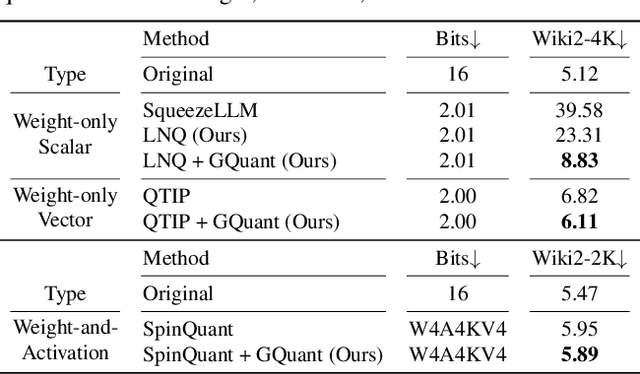
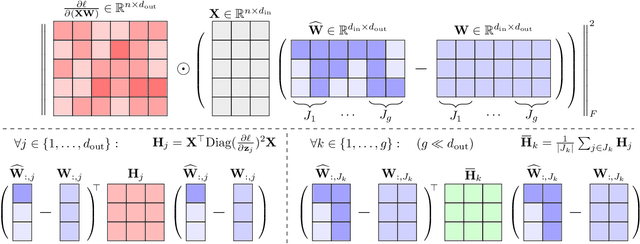
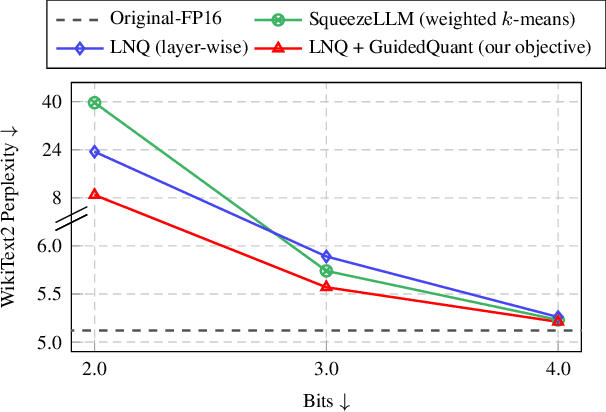
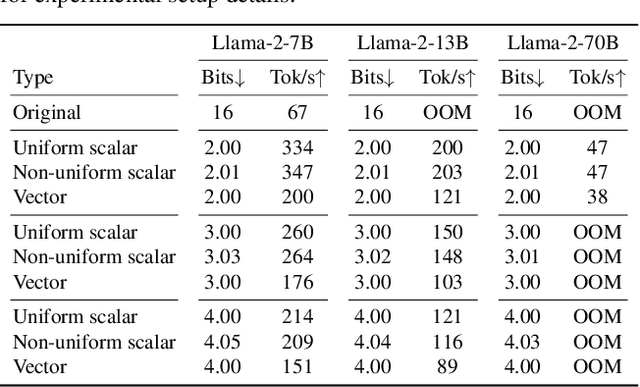
Abstract:Post-training quantization is a key technique for reducing the memory and inference latency of large language models by quantizing weights and activations without requiring retraining. However, existing methods either (1) fail to account for the varying importance of hidden features to the end loss or, when incorporating end loss, (2) neglect the critical interactions between model weights. To address these limitations, we propose GuidedQuant, a novel quantization approach that integrates gradient information from the end loss into the quantization objective while preserving cross-weight dependencies within output channels. GuidedQuant consistently boosts the performance of state-of-the-art quantization methods across weight-only scalar, weight-only vector, and weight-and-activation quantization. Additionally, we introduce a novel non-uniform scalar quantization algorithm, which is guaranteed to monotonically decrease the quantization objective value, and outperforms existing methods in this category. We release the code at https://github.com/snu-mllab/GuidedQuant.
Pushing the Envelope of Low-Bit LLM via Dynamic Error Compensation
Dec 28, 2024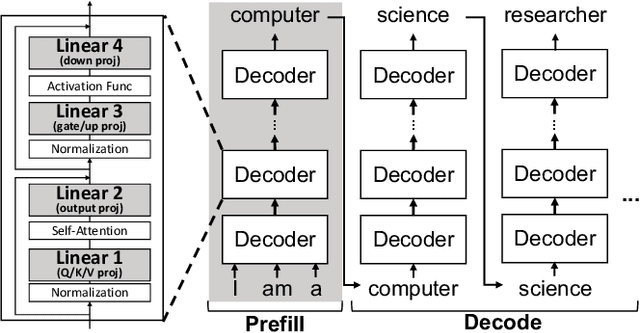
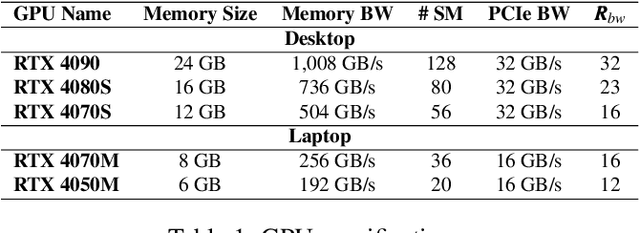

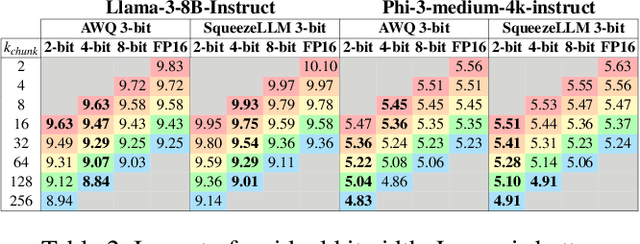
Abstract:Quantization of Large Language Models (LLMs) has recently gained popularity, particularly for on-device settings with limited hardware resources. While efficient, quantization inevitably degrades model quality, especially in aggressive low-bit settings such as 3-bit and 4-bit precision. In this paper, we propose QDEC, an inference scheme that improves the quality of low-bit LLMs while preserving the key benefits of quantization: GPU memory savings and inference latency reduction. QDEC stores the residual matrix -- the difference between full-precision and quantized weights -- in CPU, and dynamically fetches the residuals for only a small portion of the weights. This portion corresponds to the salient channels, marked by activation outliers, with the fetched residuals helping to correct quantization errors in these channels. Salient channels are identified dynamically at each decoding step by analyzing the input activations -- this allows for the adaptation to the dynamic nature of activation distribution, and thus maximizes the effectiveness of error compensation. We demonstrate the effectiveness of QDEC by augmenting state-of-the-art quantization methods. For example, QDEC reduces the perplexity of a 3-bit Llama-3-8B-Instruct model from 10.15 to 9.12 -- outperforming its 3.5-bit counterpart -- while adding less than 0.0003\% to GPU memory usage and incurring only a 1.7\% inference slowdown on NVIDIA RTX 4050 Mobile GPU. The code will be publicly available soon.
Any-Precision LLM: Low-Cost Deployment of Multiple, Different-Sized LLMs
Feb 16, 2024Abstract:Recently, considerable efforts have been directed towards compressing Large Language Models (LLMs), which showcase groundbreaking capabilities across diverse applications but entail significant deployment costs due to their large sizes. Meanwhile, much less attention has been given to mitigating the costs associated with deploying multiple LLMs of varying sizes despite its practical significance. Thus, this paper introduces \emph{any-precision LLM}, extending the concept of any-precision DNN to LLMs. Addressing challenges in any-precision LLM, we propose a lightweight method for any-precision quantization of LLMs, leveraging a post-training quantization framework, and develop a specialized software engine for its efficient serving. As a result, our solution significantly reduces the high costs of deploying multiple, different-sized LLMs by overlaying LLMs quantized to varying bit-widths, such as 3, 4, ..., $n$ bits, into a memory footprint comparable to a single $n$-bit LLM. All the supported LLMs with varying bit-widths demonstrate state-of-the-art model quality and inference throughput, proving itself to be a compelling option for deployment of multiple, different-sized LLMs. The source code will be publicly available soon.
Ginex: SSD-enabled Billion-scale Graph Neural Network Training on a Single Machine via Provably Optimal In-memory Caching
Aug 19, 2022



Abstract:Recently, Graph Neural Networks (GNNs) have been receiving a spotlight as a powerful tool that can effectively serve various inference tasks on graph structured data. As the size of real-world graphs continues to scale, the GNN training system faces a scalability challenge. Distributed training is a popular approach to address this challenge by scaling out CPU nodes. However, not much attention has been paid to disk-based GNN training, which can scale up the single-node system in a more cost-effective manner by leveraging high-performance storage devices like NVMe SSDs. We observe that the data movement between the main memory and the disk is the primary bottleneck in the SSD-based training system, and that the conventional GNN training pipeline is sub-optimal without taking this overhead into account. Thus, we propose Ginex, the first SSD-based GNN training system that can process billion-scale graph datasets on a single machine. Inspired by the inspector-executor execution model in compiler optimization, Ginex restructures the GNN training pipeline by separating sample and gather stages. This separation enables Ginex to realize a provably optimal replacement algorithm, known as Belady's algorithm, for caching feature vectors in memory, which account for the dominant portion of I/O accesses. According to our evaluation with four billion-scale graph datasets, Ginex achieves 2.11x higher training throughput on average (up to 2.67x at maximum) than the SSD-extended PyTorch Geometric.
A$^3$: Accelerating Attention Mechanisms in Neural Networks with Approximation
Feb 22, 2020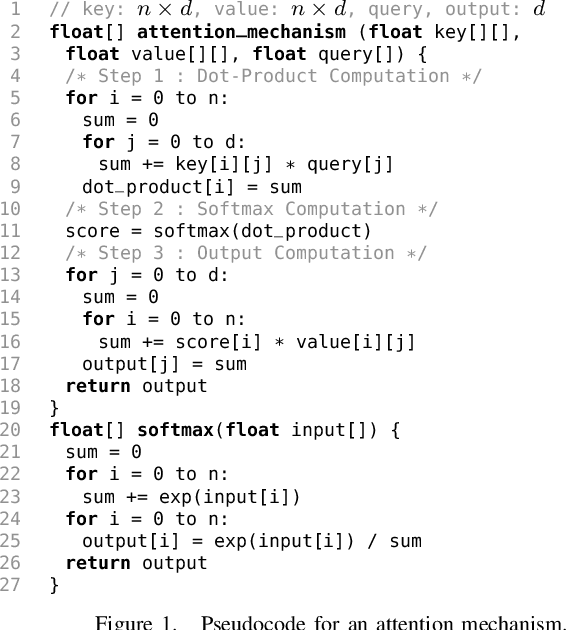

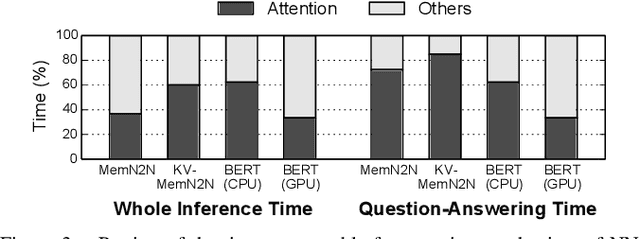

Abstract:With the increasing computational demands of neural networks, many hardware accelerators for the neural networks have been proposed. Such existing neural network accelerators often focus on popular neural network types such as convolutional neural networks (CNNs) and recurrent neural networks (RNNs); however, not much attention has been paid to attention mechanisms, an emerging neural network primitive that enables neural networks to retrieve most relevant information from a knowledge-base, external memory, or past states. The attention mechanism is widely adopted by many state-of-the-art neural networks for computer vision, natural language processing, and machine translation, and accounts for a large portion of total execution time. We observe today's practice of implementing this mechanism using matrix-vector multiplication is suboptimal as the attention mechanism is semantically a content-based search where a large portion of computations ends up not being used. Based on this observation, we design and architect A3, which accelerates attention mechanisms in neural networks with algorithmic approximation and hardware specialization. Our proposed accelerator achieves multiple orders of magnitude improvement in energy efficiency (performance/watt) as well as substantial speedup over the state-of-the-art conventional hardware.
 Add to Chrome
Add to Chrome Add to Firefox
Add to Firefox Add to Edge
Add to Edge